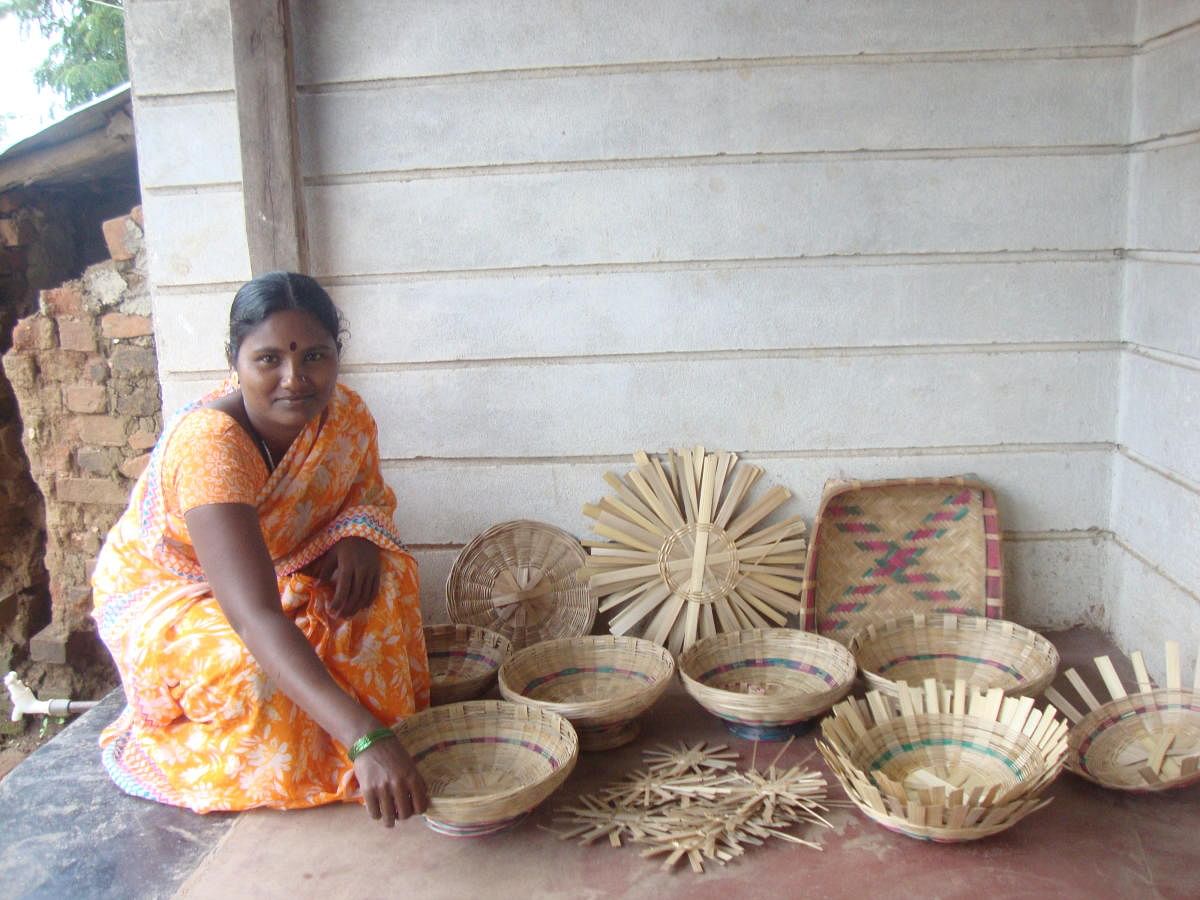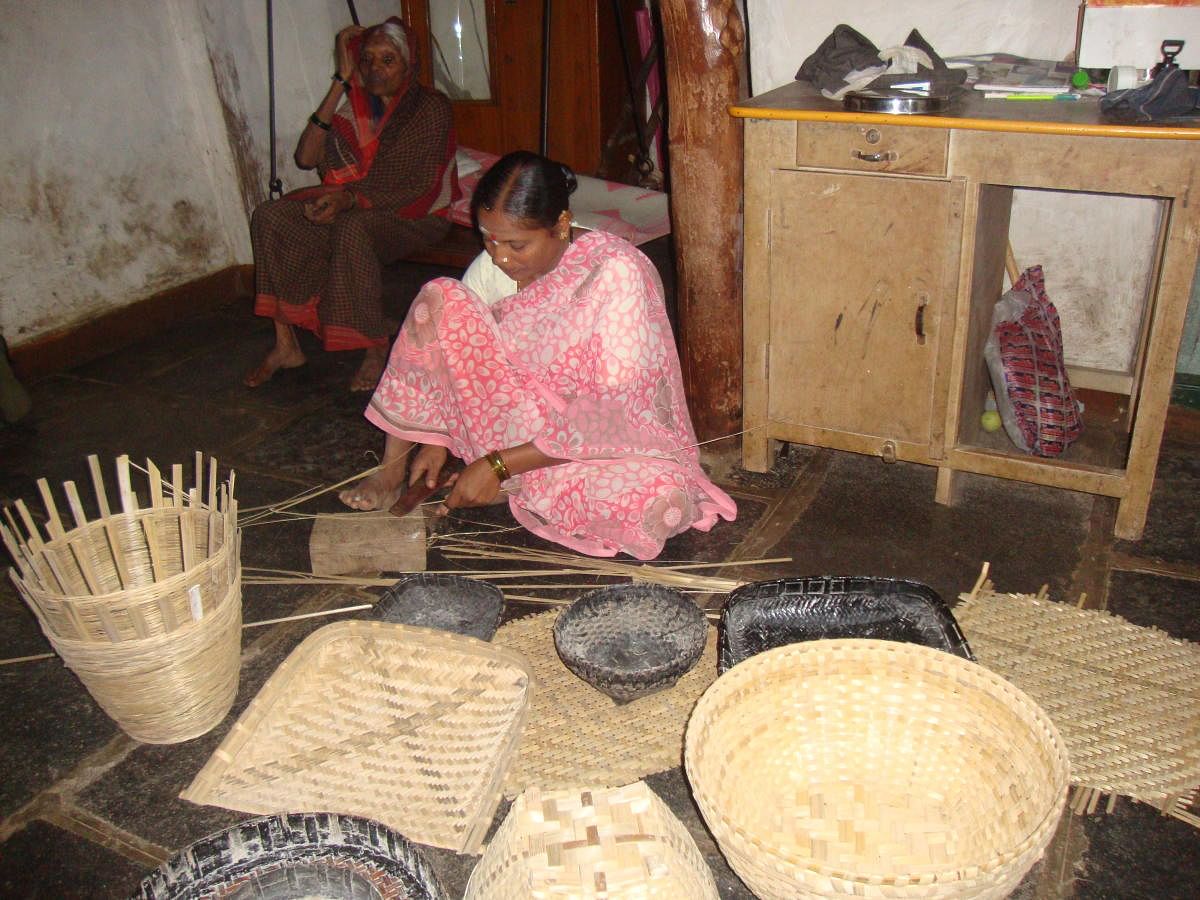

Seated on the half-constructed jagali, Geetha picks up a long sliver of sliced bamboo and weaves it for a basket. Geetha’s husband Ashok sits close to her and slices the bamboo. Ashok’s mother, Gangavva, squats in a corner, weaving the base.
As our conversation begins at their house in Mugad village of Dharwad district, the tale of Medar community, which is traditionally engaged in making bamboo products, unfolds. “Those days, 30 families were engaged in weaving baskets of different colours, designs and sizes,” she recalls.
“Farmers placed orders for bamboo baskets. In return, they gave us grains,” she says. “Life changed rapidly due to low-cost plastic replacements. The plastic products took a toll on us,” she adds. Ashok points out: “Today, only three families are engaged in bamboo basketry in Mugad.”
The traditional bamboo craftspersons are facing challenges as this occupation has seen a gradual decline over the years. In the past, Medars would collect the raw material from the forests of nearby Kalkeri village, which had bamboo trees in abundance. They would chop bamboo branches, leave them there for four days for the branches to dry up. They would transport the branches in bullock carts to lakes and soak them in water for two days. Then they would store soaked branches on the loft of their house.
The bamboo was easily and freely available as the trees were grown on the government land. “We would slice the branches based on requirement and weave baskets. We directly sold the baskets to farmers. The bamboo basketry and agriculture were connected occupations,” he says.
The government policy prevented Medars from chopping off bamboo branches and needed them to buy the branches only from the government depot. This has affected the traditional bamboo basketry badly.
After the new policy, Medars have to purchase the branches from the forest depot at a far off town, Khanapur. As a result, the cost of production has increased. Coinciding the policy was the arrival of plastic baskets in the market.
Decline in the demand for bamboo baskets forced most Medars to shift from their traditional occupation as it no more generated sufficient revenue. However, Ashok’s family continued to engage in this craft. “My father taught me bamboo craft. My wife is also a skilled worker. Bamboo basketry is our primary source of livelihood,” he explains. “It’s basically a manual work. The profit is based on productions,” he says, even as his fingers quickly roll on the sliced bamboo pieces. The family weaves about eight baskets every day. At times, the couple weave about 100 baskets over a month and carry them to Dharwad for sale.
“By the grace of Goddess Yellamma, we are doing good. Devotees buy padalagi (a type of bamboo basket needed for a ritual) every year during the car festival at the Yellamma temple. We sell Padalagi and Parashuram baskets in large quantity,” she adds. The couple explored the possibility of marketing their products directly to the customers, but failed. “We carried baskets to Krishi Mela at the University of Agricultural Sciences, Dharwad, to sell directly to customers. Despite waiting from dawn to dusk, there were no buyers. We were forced to sell the baskets to the middlemen,” Geetha added.
“We borrow money from farmers and self-help groups to buy the branches. The margin of profit is thin,” Ashok says. “Change in the weather pattern has affected the quality of bamboo. Branches are no more soft. It’s difficult to slice them into thin pieces. At times, we use the branches as firewood as they are not ideal for basketry,” he explains. The family weaves winnows, sieves, and baskets to keep jowar rotis. That they have the work throughout the year is the lone satisfaction for them.
Gadigeshwari is another master craftswoman. There is a huge demand for the baskets she weaves as her products highlight the intricate craft of bamboo basketry. Naturally, a large number of farmers are her customers.
Gadigeshwari’s mother-in-law spent 60 years of her life weaving the baskets. Showing a sieve which she wove 30 years ago, she says, “I oiled it after weaving. And it is in a good condition even today.” To complement her occupation, Gadigeshwari bought four cows and took up dairy farming. “I sell the milk and earn additional revenue,” she says. Professional craftspersons like Gadigeshwari are rarely found today.
“As we work continuously sitting in the same posture, we suffer from pain in the back and waist. There are occasions when our fingers are swollen,” she says and adds, “But our life is inseparable from this craft.”
(Translated by Jagadish Angadi)